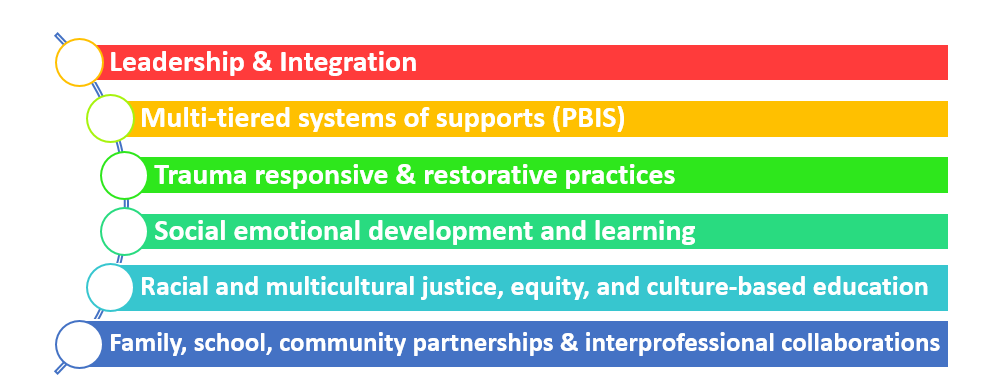As COVID and racial and multicultural injustice continue to impact our world, there is a critical need to address the far-reaching trauma-related effects of the dual pandemics. To do this, we need a workforce that understands the individual, contextual, and structural mechanisms that prevent and heal adversity, address trauma, and build resilience.
Beginning this fall, the College of Education and Social Services launched UVM’s Certificate of Graduate Study in Resiliency-Based Approaches (RBA). The RBA framework (figure 1) teaches students skills to engage in restorative, trauma-informed, and collaborative approaches alongside families, schools, and communities.
Figure 1: Resiliency-based Approaches Framework

Although graduate courses in trauma and resilience have been available at UVM for over five years, the new RBA certificate provides enhanced content and flexibility for students and professionals in the field.
“The online structure of our program allows working professionals to engage in a way that supports work-life balance while also opening up access to students from across New England, even as far as Hawaii where we have a cohort joining us from Kamehameha Schools,” explained Professor and Program Director Strolin-Goltzman. The program is designed for students from many fields including teaching, counseling, child welfare, mental health, nursing, emergency medicine, coaching, and other professions, she says.
Through 15 credits of graduate coursework, students gain a deeper socio-ecological understanding of the structural solutions inherent in equity, culturally sustaining partnerships, and resilience. Students also learn about the impact of trauma and adversity and build a toolbox of skills for fostering resilience by building and restoring relationships with families, schools, and communities.
The certificate of graduate study in RBA includes 9 credits of core coursework and 6 credits of electives in one of two tracks: Trauma-responsive and Restorative Practices (TRP) or Family-school-community partnerships and interprofessional collaboration (FSC).
Impact on Student Learning
“In so many ways, being trauma-informed is a mindset or lens along with set of tools. Being trauma-informed means redesigning systems that recognize and work from strengths, in collaboration and across sectors, to grow resilience in everyone,” says Mary Zentara, a recent graduate of the course sequence.
Other impacts of the course on student and educational outcomes are highlighted in a recently published article in a U.S. Department of Health and Human Services newsletter written by Dr. Haley Woodside-Jiron, Associate Professor and core faculty member in the certificate program.
Impact on the Field
“I have already seen the ripples of this certificate program and coursework in the field,” says Jennifer Jorgenson, Director of the Foster, Kin and Adoptive Families Training Team in UVM’s Child Welfare Training Partnership, who is also a core instructor in the certificate. “I have witnessed the rising up of interprofessional learning communities that create a rich foundation for collaborative practice and strengthen practices across child welfare, education and other health related systems. We are seeing the seeds of influence from the trauma lens.
Stackable Graduate Credential
The certificate of graduate study is a stackable credential that can stand alone, be completed simultaneously with a graduate degree (e.g., Counseling M.S. or Social Work MSW) or can stack into graduate degree programs in Curriculum and Instruction (M.Ed.), Educational Leadership and Policy Studies (M.Ed.), and Special Education (M.Ed.), and Educational Leadership and Policy Studies (Ph.D. or Ed.D.). Students in the MSW program can take the certificate as a supplement to their degree.
To learn more about the program, visit the Resiliency-Based Approaches web page.